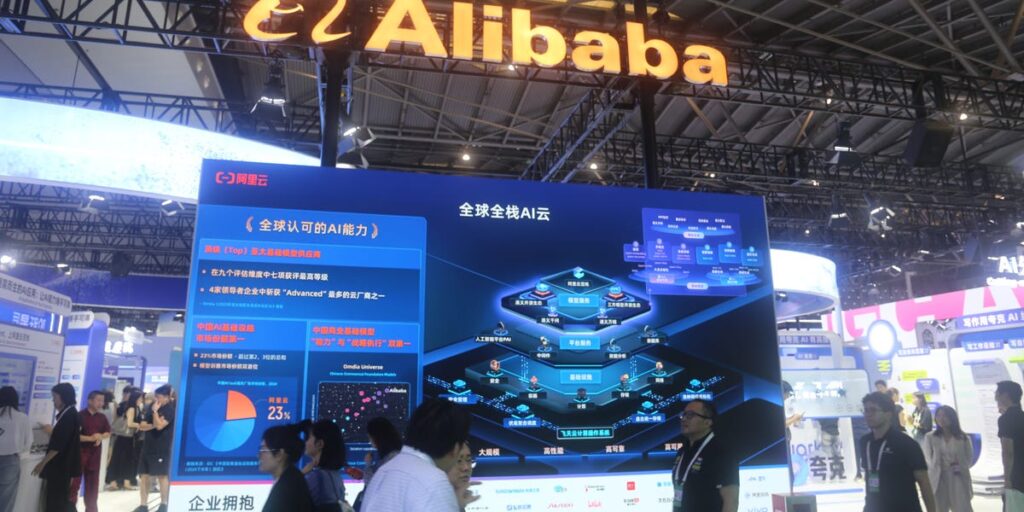Tech giant Alibaba has been fighting a bruising food delivery war in China. But the company’s latest earnings make it clear that artificial intelligence is what investors really care about.
On Friday, Alibaba reported a 2% rise in overall revenue to 247.65 billion Chinese yuan, or $34.6 billion, for the quarter ended June 30 — missing analysts’ forecasts of $252.92 billion yuan in revenue. Operating profit dropped 3% to 35 billion yuan.
Despite that drag, investors piled in.
Alibaba’s New York-listed shares closed 12.9% higher on Friday to $135 apiece, while its Hong Kong-listed stock gained as much as 18% Monday morning.
The rally was fueled by a triple-digit percentage gain in AI-related product revenue and Alibaba Cloud’s 26% year-over-year revenue surge to 33.4 billion yuan — beating analyst expectations for an 18% rise.
That performance underscores how investors are zeroing in on AI as Alibaba’s next growth engine.
“Our investments in AI have begun to yield tangible results,” said Alibaba Group CEO Eddie Wu on Friday’s earnings call.
“We’re seeing an increasingly clear path for AI to drive Alibaba’s robust growth,” Wu said.
Analysts are upbeat too.
“For Cloud, it maintains accelerating growth on rising AI adoption with enhanced modeling capabilities and strong inference/training demands,” wrote equity analysts at Jefferies on Friday.
That long-term upside explains why investors are looking past the bruising economics of food delivery.
Quick commerce drags on profits
The cloud boom stands in sharp contrast to Alibaba’s costly delivery battles.
Alibaba’s China e-commerce business — which includes its traditional e-commerce and food delivery businesses — managed a 10% revenue growth from last year, to 140 billion yuan.
But, earnings before interest, taxes, and amortization fell 21% from a year ago amid heavy subsidies for food delivery and instant shopping.
That weakness reflected the heavy toll of Alibaba’s quick commerce push. It has been burning billions of yuan to compete with rivals Meituan — the market leader — and new entrant JD.com in food delivery and instant shopping.
Jiang Fan, Alibaba’s e-commerce chief, acknowledged on Friday’s call that the company has spent heavily to build up the quick commerce business, but said the losses will shrink as repeat customers drive efficiency.
Nomura analysts wrote on Monday that Alibaba’s quick commerce sector has scaled up enough for the company to “shift emphasis from land grabs to optimizing efficiency.”
Chelsey Tam, a senior equity analyst at Morningstar, struck a similar note, arguing Alibaba is better positioned in the current food delivery battle.
“We believe Alibaba has leveraged its ecosystem resources far more effectively than in previous food delivery competitions, increasing its chances of gaining market share and achieving profitability in the medium term,” wrote Tam on Friday.
Alibaba’s stock is 59% higher in New York this year. Its Hong Kong-listed stock is up 65% over the same period.
Read the full article here


